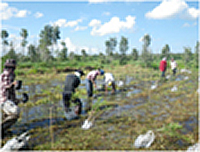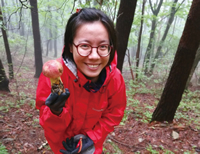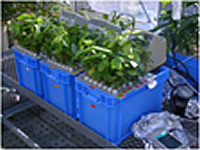 |
| Laboratory of Forest Management | Laboratory of Silviculture | Laboratory of Forest Policy | Laboratory of Forest Biogeosciences | Laboratory of Forest Utilization| Laboratory of Forest Botany | Laboratory of Forest Zoology | Laboratory of Forest Landscape Planning and Design | University Forests | Asian Natural Environmental Science Center | |||||||||||||||
|
|
|||||||||||||||
| Laboratory of Tree Physiology and Tropical Silviculture | |||||||||||||||
| Tolerance mechanisms of trees to environmental stresses and environmental reforestation of tropical degraded lands | |||||||||||||||
| Since tree species, which are wild and long-living plants, have likely acquired environmental stress tolerance mechanisms that are not found in model plants or crop plants, research on stress physiology in tree species is meaningful. Our laboratory conducts experiments examining the mechanisms of environmental stress tolerance of tree species in controlled environments and field experiments related to environmental reforestation. The results will deepen our understanding of trees and forests, and contribute to the development of techniques for establishing various forest types. | |||||||||||||||
| ●Aluminum tolerance mechanisms of Melaleuca cajuputi (Doctoral Thesis) ●Transport and metabolism of photosynthates in flood-tolerant tree species (Doctoral Thesis) ●Root carbon metabolism under rhizospheric hypoxia in Melaleuca cajuputi seedlings at different developmental stages (Master’s Thesis) ●Dynamics of carbohydrate storage under hypoxia in Myrtaceae trees (Master’s Thesis) ●Phenylalanine ammonia-lyase activity in the roots of tropical trees under rhizosphere hypoxia stress (Master’s Thesis) |
|||||||||||||||
|
|||||||||||||||
| Website of the Laboratory of Tree Physiology and Tropical Silviculture | |||||||||||||||
|
|
|||||||||||||||
| Laboratory of Forest Symbiology | |||||||||||||||
| Genetic diversity and reproductive characteristics of plants and microorganisms and the physiology and ecology of ectomycorrhizal fungi | |||||||||||||||
| Our laboratory focuses on three research subjects: 1) the genetic diversity and reproduction dynamics of plants and microorganisms in a variety of ecosystems in Asia using molecular techniques for the conservation and management of biodiversity; 2) the response mechanisms of mycorrhizal symbiosis to different stress conditions, such as heavy metal and alkaline stresses, for vegetation restoration; and 3) the formation mechanisms of tree-mycorrhizal symbiosis and the fruiting bodies of ectomycorrhizal fungi for the cultivation of the edible mushrooms of ectomycorrhizal fungi. | |||||||||||||||
| ●Population genetic structure and reproductive patterns of plants and ectomycorrhizal fungi ●Establishment mechanisms of symbiosis between trees and mycorrhizal fungi ●Application of mycorrhiza for revegetation of degraded land ●Development mechanisms of fruiting bodies of ectomycorrhizal fungi |
|||||||||||||||
|
|||||||||||||||
| Website of the Laboratory of Forest Symbiology | |||||||||||||||
|
|
|||||||||||||||
| Laboratory of Tree Environmental Physiology | |||||||||||||||
| Environmental responses of trees and reforestation of degraded tropical lands | |||||||||||||||
| Inadequate agricultural developments have resulted in vast areas of abandoned lands. The environments of those lands are very different from those of the original forest ecosystem, which makes reforestation difficult. Since reforestation aims to establish environmentally low-impact production systems, it is desirable that the process is also low-impact. Plants can adapt to changes in the environment via changes in their morphology and physiology. Our laboratory investigates the mechanisms of tree environmental responses and examines their application to reforestation of degraded lands. | |||||||||||||||
| ●Responses of water and nutrient uptake by roots subjected to environmental stresses ●Photosynthetic responses to environmental stresses ●Environmental responses of trees planted on degraded lands. |
|||||||||||||||
|
|||||||||||||||
|
|
|||||||||||||||
| Department of Forest Science, The University of Tokyo |






